The COP30 organisers are committed to putting cities front and centre in Belém. Both large metropolitan regions and rapidly growing secondary cities hold enormous potential for emissions reductions and climate resilience. For example, measures to expand green infrastructure and expand parks and urban gardens in cities can mitigate urban heat islands while also reducing the risks of flooding.
There is also a push at COP30 to promote more climate and nature-positive cities. Compact urban planning that brings residential areas closer to jobs cuts commuting times and reduces pollution. At the same time, investments in electrified public transit and expanded cycling and pedestrian infrastructure reduces reliance on cars and improves health. Retrofitting buildings, improving energy efficiency, and scaling nature-based solutions are all cost-effective strategies with multiple pro-climate benefits.
COP30 will also focus on frontier cities that play an outsized role in shaping patterns of deforestation, biodiversity loss, and emissions.
Cities in Brazil’s cattle and agricultural corridors and Zambia’s copperbelt are at the edge of forests and extractive zones. It is important to broaden the scope of the “just transition” agenda beyond coal, to include land-intensive urban economies reliant on soy, livestock, timber, and mining.
Another critical priority for COP30 involves scaling-up urban climate finance, especially for greener transportation, energy and building.
Currently, just 23 per cent of the US$800 billion in annual public urban climate finance needed by 2030 has materialised. Proposals include expanding access to urban-dedicated finance mechanisms, such as the Green Cities Facility within the Green Climate Fund and the Sustainable Cities program of the Global Environment Facility.
But for these resources to be effective, they must be accessible, standardised, and tailored to the operational realities of municipal governments. Critically, they also need to act as levers to unlock blended finance from private capital markets if cities are going to have any hope of bridging the financing gap for mitigation and adaptation which is estimated to be in the trillions of dollars from 2030-2050.
Another COP30 priority is the promotion of nature-based and circular economy systems in cities. This includes measures such as wetland restoration, rewilding of degraded areas, permeable pavement, and urban forests to reduce emissions, curb heat, and enhance livability, especially for the most vulnerable.
While many of these approaches have gained traction in cities across Europe, they must become the global norm.
COP30 is a pivotal opportunity not only to finally scale-up urban finance, but also to fast-track nature-positive, climate-resilient urban development where it matters most.
Elevating cities to the centre of both the negotiation and implementation agendas is essential to delivering a just and actionable response to the climate crisis for the billions who live in cities and for the ecosystems they help shape.
This story was published with permission from Thomson Reuters Foundation, the charitable arm of Thomson Reuters, that covers humanitarian news, climate change, resilience, women’s rights, trafficking and property rights. Visit https://www.context.news/.





Leave a Reply